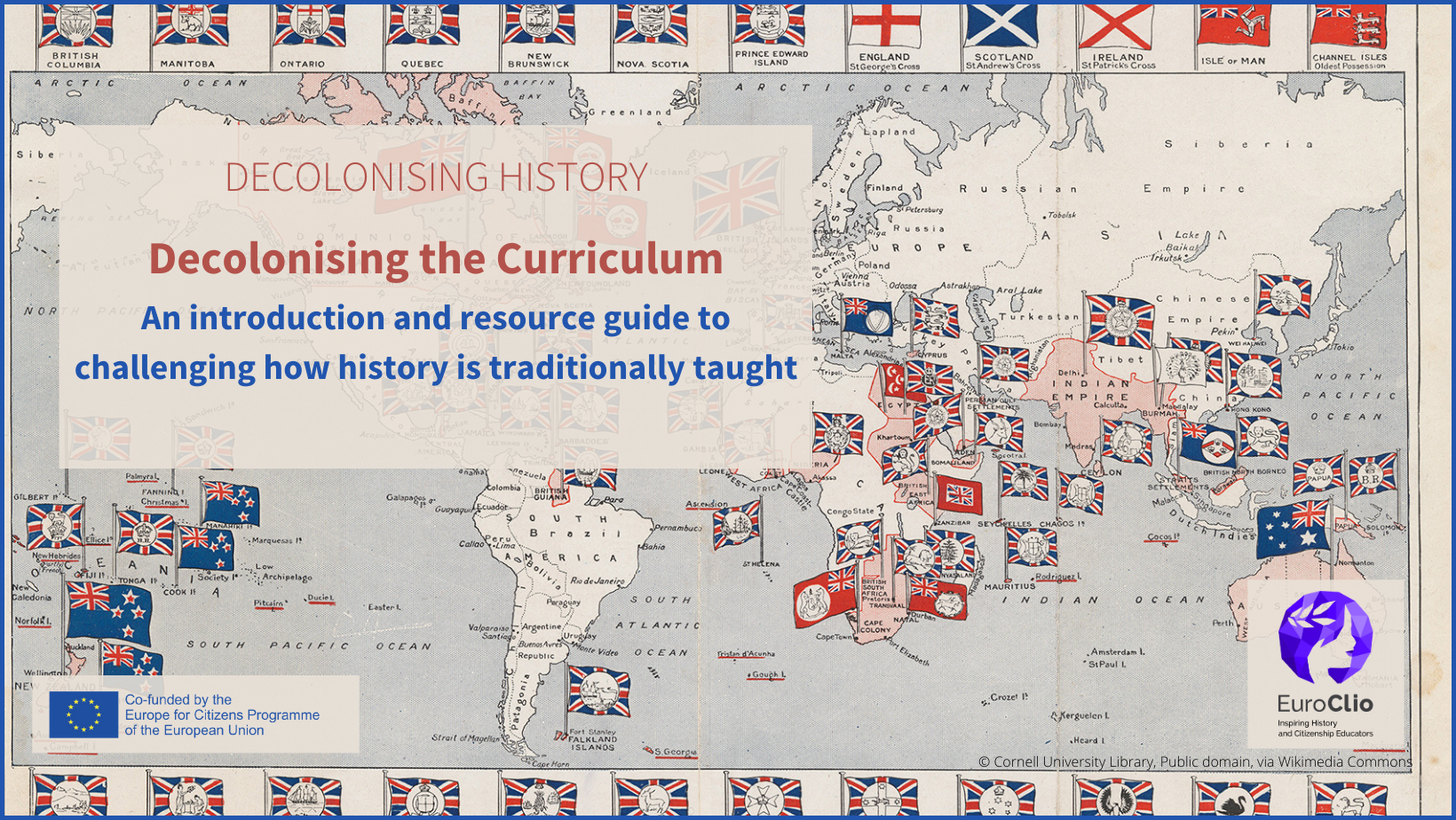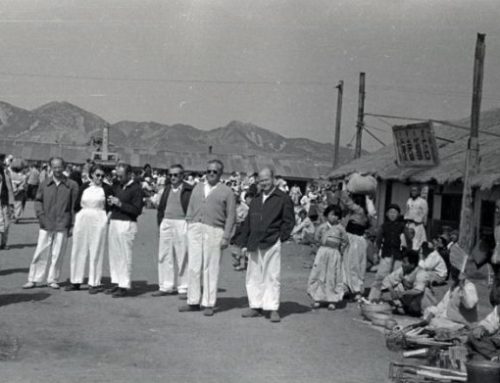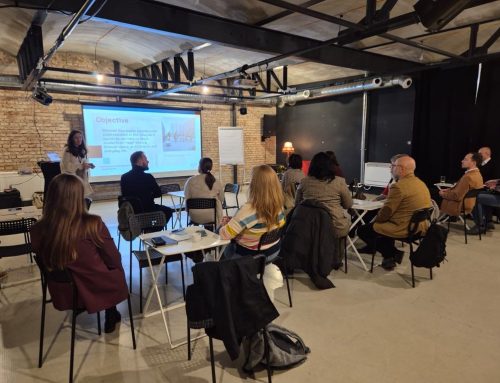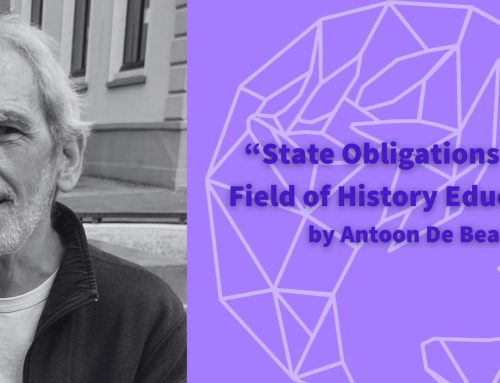Decolonisation, while not a new concept, has increasingly been given light in public and academic discussion in recent years. Maybe you have seen calls to “decolonise your classroom” or “decolonise the curriculum”, but are not sure what this really means, or how to go about it. In April and May, EuroClio is focusing on decolonisation – most notably with a dedicated webinar series on the topic. This blog post we hope serves as a first introduction to the concept decolonisation in the history classroom and the history curriculum more broadly, with background information and resources for how to put these ideas into practice in classrooms across Europe.
What is decolonisation?
Decolonisation can refer to the historical events in which many former colonies became independent countries. Decolonisation as we discuss here refers to a wider movement to address and decentre hegemony established by colonisation.
In history teaching this results in two main aims:
- Increasing content pertaining to colonised and marginalised peoples.
- Challenging how Western and European history is traditionally constructed and taught
Scholars emphasise that one cannot be done without the other. For example Canadian scholar Sarah Nickel criticises an “add-and-stir” approach, in which indigenous peoples may be acknowledged in Canadian history, but the conventional narrative of the country which privileges a primarily White and British story is not seriously challenged. Methods are as important as content when it comes to decolonising the history classroom.
Why decolonise the curriculum?
The aims and methods of decolonising history dovetail with EuroClio’s wider mission for responsible and innovative history, citizenship, and heritage education by promoting critical thinking, multiperspectivity, mutual respect, and the inclusion of controversial issues. Here are some key points for why decolonising the curriculum is important for European history education.
Breaking down the ‘natural order’ of current (historical) hegemony.
History has and continues to be a powerful force in European society. Traditional national narratives may ignore or not fully address the history and lived experiences of colonised people. Critically questioning what stories are left out and why helps to dismantle systems that can privilege some groups over others.
Allow for greater critical thinking.
A decolonised history curriculum, beginning from younger ages, can improve discourse at higher levels. Often ‘challenging’ or ‘sensitive’ topics relating to colonial history are left out of the curriculum for younger students. However without a baseline knowledge, such important topics cannot be properly interrogated at secondary or post-secondary levels.
History skills building
A key component of a decolonised history curriculum is questioning how history is formed and taught in the first place. This offers an excellent setting for students to critically engage with history as a discipline, and gain skills in history methodology and practice.
How to decolonise history?
It is key to point out that decolonisation does not necessarily mean an outright rejection or erasure of European history and disciplinary methods.
Lawrence Meda describes two main approaches to decolonisation: “The first is a radical approach where Western knowledge is fully rejected. The second is an integrative approach which seeks to accommodate both Indigenous and Western knowledge.”
Many countries in Europe have national-focused history curriculums. An integrative approach in European history education would see these integrated with new content and methods. This decentres the primary place of a Eurocentric perspective and works towards decolonising the curriculum.
What might this look like in practice? Here are some examples under our two key headings.
Increasing content pertaining to colonised and marginalised peoples.
- Examining sensitive subjects such as slavery, colonisation, persecution.
- Highlighting people of non-European descent in European history.
- Bringing in primary sources and testimony of non-Europeans
Challenging how history is conventionally taught.
- Bringing in multiple perspectives and primary sources on one historical event
- Question how narrative history has privileged one story or group over others
- Examining resources not conventionally used in the European historical tradition. For example: oral history, legends, modern art and media.
Contact us!
- Would you like more information on the upcoming webinar series?
- Do you have a great lesson or practice that you would like to share with the EuroClio Community?
- Have you read a beautiful book that can be used to teach about colonial history, or to make our way of teaching the past more representative of minorities?
- Have you listened to a great podcast?
- Do you know where we can find sources to make our lessons more representative?
If your answer to any of there questions is yes, we would like to know more! Please, reach out at secretariat@euroclio.eu with the subject line “decolonising history”. We will be in touch as soon as possible. You can also find more information on the webinar series on the event page.
Online Classroom Teaching Resources
Below you can find a selection of online resources and lesson plans that you can integrate into your classroom relating to decolonising the curriculum.
Resources in English
- Zinned Project
- The Zinn Education Project promotes and supports the teaching of people’s history. They offer a wide variety of teaching materials, and have a good search function to filter by time period, theme, or keyword. Registration is free but required to access the teaching materials.
- Facing History’s Educator Resources
- Facing History’s resources address racism, antisemitism, and prejudice at pivotal moments in history. Their online resource collection includes primary sources, videos, teaching strategies, lesson plans, and full units. Good search function which clearly labels the type of resource it is.
- Teach Native Histories – Lesson Plans
- The primary focus of this website is on developing curriculum resources for the United States, but its extensive lesson plan list offers inspiration for new methods as well as content for history education.
- Teaching Black British History: A Teacher Training Guide
- Discover how to best teach and embed Black British history into the national school curriculum with this informative course. From pedagogy in the classroom to the history of ethnocratic and eurocentric narratives, this comprehensive, three-week course equips you with all the tools you need in order to best teach and embed Black British history into your school curriculum.
- The 1619 Project Curriculum
- The 1619 Project is a challenge to reframe United States’ history by marking the year when the first enslaved Africans arrived on Virginia soil as the USA’s foundational date. It offers eleven free full lesson plans relating to this topic.
- Learning Resources — The Black Curriculum
- A social enterprise that aims to deliver black British history all across the UK. Offer short lesson plans based on eight topics, supported by a video. Lesson plans are geared towards England’s groups of Key Stage 2 (ages 7-11) and Key Stage 3 (ages 11-14). Also can be booked for virtual and in-person lessons, teacher training, and assemblies.
- Critical Analysis: Apesh*t Music Video
- Full lesson plan centred on a critical analysis of the music video “Apesh**t”, The Carters (Beyonce and Jay-Z) and the underrepresentation or misrepresentation of black people in museums.
- The Decolonization Group: Practices & Techniques In Decolonizing Teaching, A Short Guide
- Eight-page PDF that summarizes the discussion at an October 2020 seminar. Offers classroom level examples and perspectives, and lists sources of further reading. Available in English and Dutch.
- Historiana webinar – Colonies’ Contributions to WW1
- EuroClio webinar conducted in February 2021. Highlights reasons for teaching colonies’ contributions to WW1 and how to teach Historical Perspective-Taking (HPT). It also presents an e-learning activity using Historiana resources. You can read the article about the webinar here
- Decolonising the curriculum one step at a time: lessons on race in the early British Empire
- In this blogpost, Jen Thornton, Head of History at Loreto Grammar School, shares her recent work to improve the history curriculum. Jen started by listening to students, she has gone back to the scholarship to gain the knowledge she needs, she has consulted and worked with colleagues, and she is clear that this is work in progress. Her description of this work and her generous sharing of resources will be encouraging and helpful to colleagues planning to make changes too.
- Richard Kennett’s YouTube channel
- Richard Kennett is a specialist leader of education in History and head of History at Redland Green School in Bristol. In his YouTube channel, he offers various video resources on topics such as slavery and the Holocaust.
- Native Land
- Interactive map of indigenous groups. It predominantly focuses on the Americas, but it also lists some groups in Northern Europe.
- #PastFwd: “Do Students know what race is? Do we? Does it matter?”
- Alistair Dickins makes a very compelling argument on the importance of people’s understanding of the concept of “race” and its actual meaning before engaging with racism, slavery and discrimination in history.
- Decolonising Europe: Decolonising the curriculum
- Online lecture of the ACES (Amsterdam Centre for European Studies) on Decolonising Europe in International Politics. The focus of the discussion is on the practical applications of decolonial theories: how to decolonize the curriculum in practice, and how to apply a decolonial approach to our teaching and researching.
Resources in Dutch
- International Institute of Social History
- Tropen Museum in Amsterdam
- Untill July 2021, the Topen Museum in Amsterdam hosts interactive programmes – Present of the slavery past – for high school students, they also provide teaching material
- Teaching material slavery past
- A joint initiative from Netwerk Slavernijverleden, platform Educatie and the National Institute of Dutch Slavery past and heritage (NiNsee), the website is solely dedicated to teaching material relating to slavery
- Klascement
- Klascement is a Belgian platform in which teachers can publish their own material. On their website you can find a wide range of content among which slavery, colonialism and Leopold II
Resources in French
- Académie de Strasbourg
- Renaud Weisse, Professor at Stanislas de Wissembourg, gives a practical example of how to teach Colonisation et décolonisation and other teaching material in the Ressources Pédagogiques section (in French)
- Fondation pour la Mémoire de l’Esclavage
- The mission of the foundation is to help young people understand how the France of today is: they offer a set of resources and tools to educate about the complex history of slavery in France.
Resources in Italian
- La Scuola Oltre la Siepe – KIT DIDATTICO per superare i pregiudizi con Harper Lee
- “La scuola oltre la Siepe” is a project by Il Razzismo è una brutta storia, an Italian association whose aim is to combat racism and discriminations through cultural initiatives and educational projects. The project is an educational project for teachers and educators inspired by Harper Lee’s novel To Kill a Mockingbird that aims to promote inclusive education and multiperspectivity. Direct link to the Toolkit, to the Teaching and Learning Strategies document, DecolonizeEducation sources.
- I kit didattici
- Toolkits provided by ‘Polo del ‘900’ on controversial issues (migration, remembrance education, fascism) to develop pupils’ critical thinking skills
Resources in other languages
- House of European History
- The museum is based at the EU parliament in Brussels, and four lesson plans relate to their permanent exhibitions. The lesson plans are made to connect the teaching of European history to the contemporary world. Available in all 24 EU languages.
- Samer.se/skola
- Lesson plans on Sápmi and the Sami people (in Swedish)
- Reaidu
- A website for teacher students on the history, language and culture of Sápmi and the Sami people and how to use it in the Norwegian curriculum by the The University of Tromsø – The Arctic University of Norway (in Norwegian)
Additional reading and relevant initiatives
History Extra: What Does ‘Decolonise History’ Mean?
Independence, Decolonization, Violence and War in Indonesia, 1945-1950
Indigenizing the Teaching of North American History: A Panel Discussion
EuroClio: Teaching the Ends of Empires
EuroClio: The 1619 Project: a very European history













